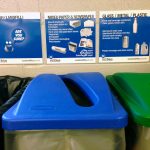 Penn State Berks participates in Single-Stream Recycling. During the spring of 2017, new möbius recycling signage and collection containers were installed across the campus. Students, faculty and staff will find three containers at each station: a container for trash (which goes to a landfill), mixed paper products, and vessels made of glass /metals/ plastics. The signage provides clarification about what types of materials can be include in each container.
Penn State Berks participates in Single-Stream Recycling. During the spring of 2017, new möbius recycling signage and collection containers were installed across the campus. Students, faculty and staff will find three containers at each station: a container for trash (which goes to a landfill), mixed paper products, and vessels made of glass /metals/ plastics. The signage provides clarification about what types of materials can be include in each container.
What to Recycle
Metal Cans:
Include steel, tin & aluminum soda, vegetable, fruit or tuna cans.
Glass Bottles and Jars:
Clear, green and brown glass can all be recycled. Ceramic mugs, plates, and drinking glasses can be recycled.
Mixed Paper:
Paper, cardboard, dairy and juice containers can be recycled. Brown paper bags, office paper, newspapers and magazines can be recycled. Bound brochures (glue or staple binding), file folders without metal clips, hard cover and paperback books, paper packaging, toilet paper and paper towel rolls, and telephone books can be recycled. Gray boxboard and paperboard is recyclable. Boxes should be emptied and flattened. Coupons and magazine inserts can be recycled.
Plastic Bottles and Containers:
Plastics labeled #1 through #7 can be recycled. Look for the SPI (Society of Plastics Industry) code on the bottom of containers. Water bottles, sports drink bottles, milk jugs, salad dressing bottles, soap and shampoo bottles, labels and caps can all be recycled.
What Cannot be Recycled
- Food waste cannot be included in any bin that is intended for recycling. Contaminants can prevent an entire container from being accepted for recycling.
- Films, plastic bags, plastic wrap, or foam cups and containers
- Yellowed wet newspaper
- Carbon Paper
- Photographs
- Plastic Bindings or Clips
- Plastic Transpaerncies
- Thermal (coated) fax paper
- Food wrapping or napkins
- Tissues or Paper Towels
- Tyvek (plastic) envelopes
- Frozen food boxes
- Packing peanuts
- Pizza boxes
- Light bulbs
- Sharps
